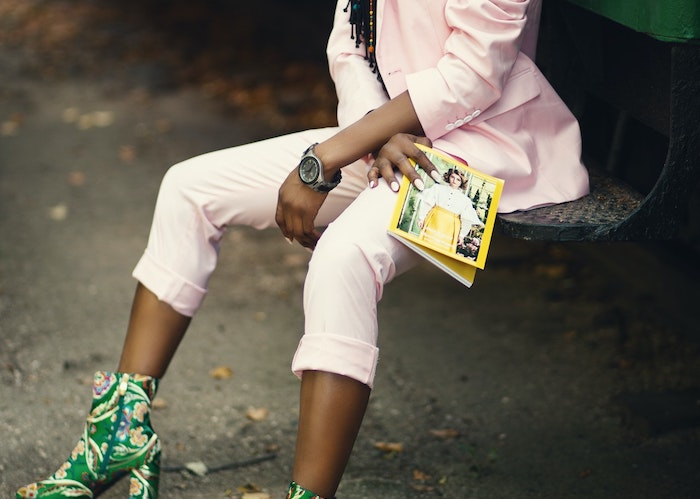My Unfiltered Thoughts On Black Women In Media

Here’s something I’ve only shared with my therapist before now: I frequently lose myself in a fever dream about what life would be like if I had seen more Black women in mainstream media growing up.
When I drift away to my little reprieve, I imagine many other things would drift away with it: my disordered eating, my childhood insecurity of never feeling “Black enough” for the other Black kids but still a “black sheep” to my other peers, the damage to my hair from straightening it for the vast majority of my life, the feeling of whiplash from hips and booty being ‘out’ one year and ‘in’ the next. I wonder if those parts of me would instead be filled with lifelong self-assurance, a sense of belonging, and never having to wonder if the person you’re dating is fetishizing you.
My familiar, little getaway is quickly interrupted and I am brought back to reality when I reach for my phone to open Instagram. Within seconds, I am swimming in a digital sea of snatched waists, altered photos, and way too much Blackfishing. Thankfully, in between the overlined lips and racially ambiguous models, I do see more Black excellence being spotlighted on social media. Lizzo is dominating the music industry. More Black artists like Ava DuVernay, Issa Rae, and Viola Davis are receiving more mainstream attention. More brands are pushing for unaltered photos and more inclusivity in their campaigns. We’re far behind in the race of progress, but we’re moving forward no less.
Though I would come to love and celebrate my skin, my body, and my Blackness as I got older, I can’t erase the years and the psychological damage endured from a lack of representation.
Despite the progress we have made, I don’t think the battle of representation should be fought by BIPOC alone. In fact, I believe all businesses have a social responsibility to examine their brands and messaging and operate with the working assumption that their ads can — and will — influence a person’s actions, self-esteem, and mental health.
Growing up “Black-ish”
One of my clearest memories from childhood involves a J-14 magazine, a picture of Britney Spears, and a toothbrush. I had begged my mom for the latest issue with the most worshipped pop stars of my time: Britney, Christina, Jessica, Mandy. While I was firm that Christina had the best vocals (still true), Britney Jean Spears was my favorite singer. I sat on the bathroom floor and cut out her photo and taped it to my mirror. Though unintentional, I had a side-by-side comparison of myself and thee Britney Spears. She was thin; I was “husky” as my grandmother would put it. Her hair had highlights; mine were in protective braids. Her teeth were straight and pearly white. Mine were crooked. I figured I couldn’t change much in a night, but I could make my teeth whiter. So I scrubbed my gums until they bled, crying when I was unsuccessful in looking more like Miss Britney Jean. My mom asked what I was doing, and I explained it’s time for me to grow up and look more grown-up, “like Britney Spears.” I couldn’t have been older than 11 or 12 years old.
When you’re 12 with limited life experience and an underdeveloped understanding of systematic issues, you tend to get one message loud and clear. Black and curvy is beautiful to some; light and petite is beautiful to all.
As a child going through puberty, I think my mom was just happy I was brushing my teeth regularly, but she did her best to show me images of Black beauty, buying me Essence and encouraging Girlfriends marathons. Her efforts didn’t go unappreciated or unnoticed. However, I also noticed that mainstream media — ahem, white media — didn’t accept darker skin and curvier bodies with the same enthusiasm as they did for bright-eyed, petite women. And when you’re 12 with limited life experience and an underdeveloped understanding of systematic issues, you tend to get one message loud and clear. Black and curvy is beautiful to some; light and petite is beautiful to all.
In years to come, I would keep pop stars taped to my bathroom mirror, a North Star reference to how I ought to look to be deemed beautiful by classmates, teachers, and society. I would struggle with disordered eating, smuggling in laxatives and diet pills from the local drug store that I bought with lunch money I never used. I would be rejected by crushes because I was “too chunky,” and I’d come to learn that my appearance — be it my skin, my features, my weight, or my hair — speaks for me before I do. And I desperately wanted it to say, “I am worthy of your love and attention.” Though I would come to love and celebrate my skin, my body, and my Blackness as I got older, I can’t erase the years and the psychological damage endured from a lack of representation.
Tokenism Is Not Representation
Our country has been conditioned to settle for tokenism and call it “progress.”
In the last 20 years, we’ve hit some revolutionary milestones in the Black community. In 2008, Tyler Perry was the first Black creator to launch his own television and film studio. In 2009, Ursula Burns became the first Black woman CEO of a Fortune 500 company. And of course, Barack Obama served as our first Black president, leading our nation from 2009 – 2017. And while their success was pivotal to American history, the stagnation of our excellence being celebrated by mainstream outlets is telling.
Our country has been conditioned to settle for tokenism and call it “progress.” Brands post photos of one Black model, maybe an Asian or Latinx model as well, and call it “inclusive.” Companies sprinkle in a model whose dress size is in the double-digits, and consumers act as if we’ve cured cancer. And while I admit that something is better than nothing, how is it 2020 and we’re still calling women “brave” for having body rolls on the ‘gram? I worry that young consumers are getting the message that having a fresh face or a healthy body untouched by waist trainers or needles is for a specific demographic and everyone else should fall in line and get slim-thick. Brands have the power to normalize normal bodies.
Blackfishing Is Not Progress
Another major issue I see is blackfishing, a form of tokenism that intersects with appropriation. It triggers a strange space within my soul. On the one hand, I am gleefully excited that we have more women of color dominating mainstream pop-culture. I am overjoyed that more young children are growing up with lyrics about self-acceptance, being a savage, and securing the bag. And I love that our standard of beauty has evolved because of our Black queens. It’s truly *chef’s kiss.*
But what my other hand can’t seem to grasp is the perpetual thievery of non-BIPOC trying to profit off of our beauty — the same beauty they couldn’t be bothered with 10, 15, 20 years ago. And to take it further, *insert clapping hands emoji throughout this next sentence* why are predominantly white publications and industries looking for a glow-up by pandering to, or appropriating from, Black culture but seem to be timid about hiring us, paying us adequately, allowing us to be more than just their ‘Black’ client or blogger, and when it comes time to book a photo shoot, they are hiring “racially ambiguous” women and not darker models? (And sometimes, it’s your own people, too. Hi Kanye.)
*****
As unproductive as wondering “what could have been,” had there been more representation, ultimately, my curiosity fuels me to shift my environment and champion change. I reach out to bloggers and companies I admire and request more inclusion within the stories they tell and the people they represent on screens. I challenge myself, daily, to confront any of my own unconscious biases. I do my best to question my own motivations and actions — am I doing this because of a childhood wound? What am I projecting here?
But it’s not enough for millions of people to burden themselves with individual change. At that rate, it will be centuries before diet culture is extinct and we’re all truly celebrated in our skin. Companies, leaders, and advertisers should be committed and held responsible for the trends and messaging they promote and for the subsequent effects of that messaging on society.
Jazmine Reed-Clark is a true crime and self-improvement junkie working in HR, and a millennial who (finally) knows the difference between a stock and a bond. She thinks.
Image via Pexels
Like this story? Follow The Financial Diet on Facebook, Instagram, and Twitter for daily tips and inspiration, and sign up for our email newsletter here.


